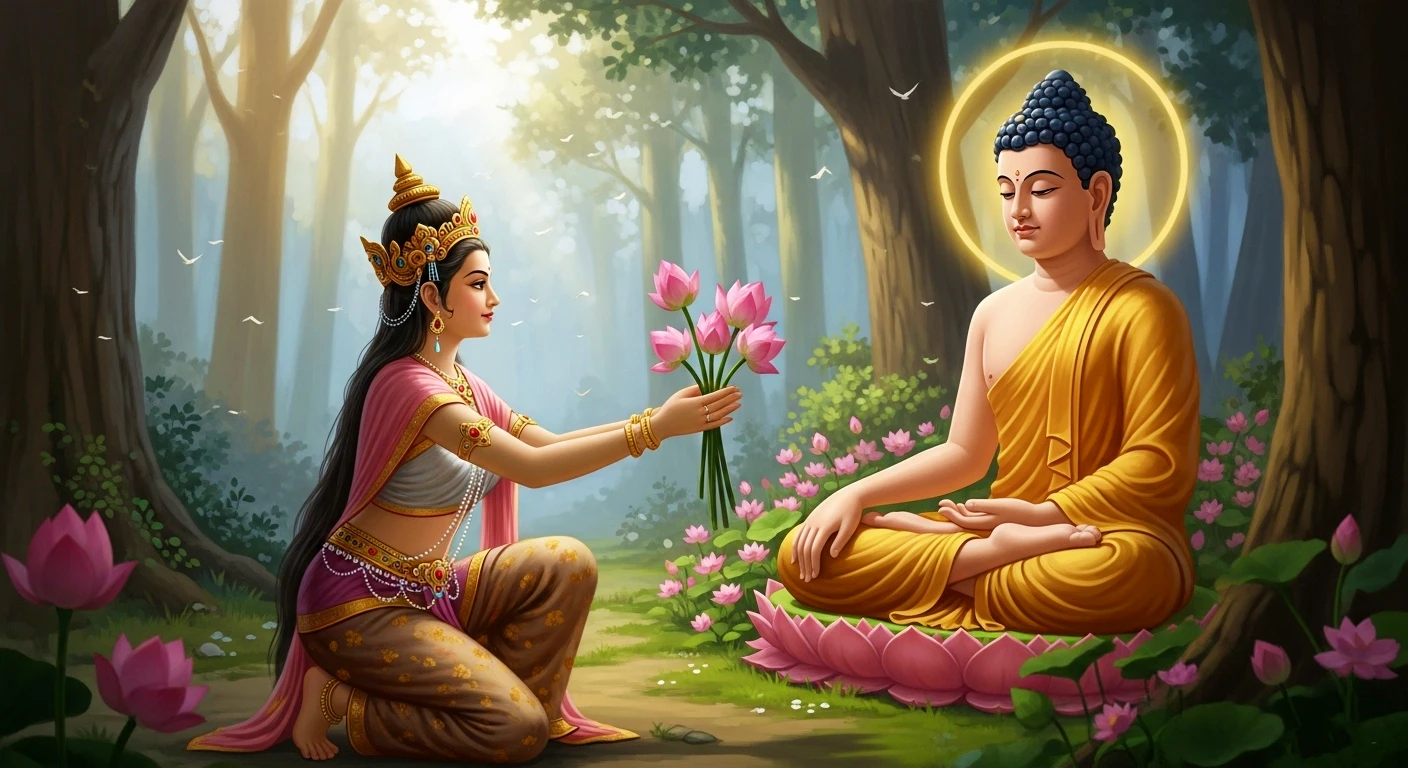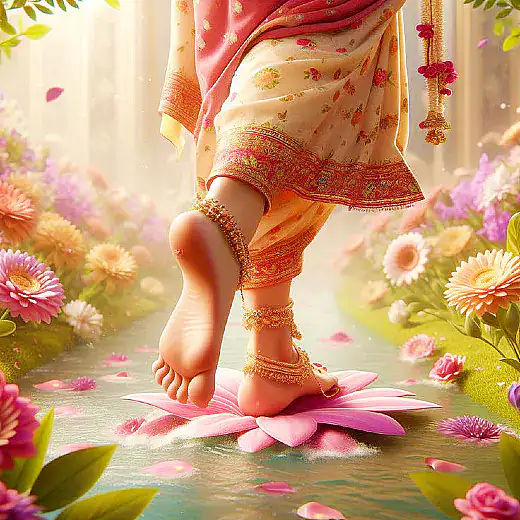Uppalavaṇṇā Therī
Her Past Aspiration
During the time of Buddha Padumuttara, Uppalavaṇṇā (Therī) was born into a wealthy family in the city of Haṃsāvatī. On one occasion, she listened to a discourse by the Buddha in the midst of a big audience, where she saw the Buddha named a bhikkhunī as the foremost bhikkhunī among those endowed with supernormal powers. She aspired to become such a great bhikkhunī in the future. She made an extraordinary offering to the Buddha and His Sangha for seven days. At the end of seven days, she placed seven bunches of lotus flowers at the feet of the Buddha as her tribute and expressed her aspiration to be the foremost bhikkhunī among those endowed with supernormal powers. Buddha Padumuttara prophesied that her aspiration would be fulfilled.
Offering of Lotus flowers to A Paccekabuddha
After passing away from that existence in which she made a lifelong dedication to the Buddha and the Sangha, she was reborn in the Tāvatiṃsa Deva realm. Next, she was reborn in the human world where she offered lotus flowers and alms-food to a Paccekabuddha. In Her Existence as The Daughter of A Rich Man
Ninety-one world-cycles ago, there appeared Buddha Vipassī during which period the future Uppalavaṇṇā Therī was born into a Rich Man’s family in Bārāṇasī. She invited the Buddha and the Sangha to her residence and made an extraordinary offering of food. Making a gift of lotus flowers to Buddha Vipassī, she mentally wished for personal charm in her future existences.

-
Save
In Her Existence as A Daughter of King Kikī
After passing away from that existence, and as a result of her meritorious deeds, the rich man’s daughter was reborn as a deva, and subsequently in the deva or human existence.
During the time of Buddha Kassapa, in the present world-cycle, she was the second of the seven daughters of King Kikī of Bārāṇasī and was named Princess Samaṇaguttā. In that existence she, like her eldest sister, the future Khemā Therī, remained a spinster for life, which lasted twenty thousand years. They donated a monastic complex to the Sangha. At her death, she was reborn in the deva realm again.

-
Save
In Her Existence as Ummādantī
After passing away from the deva realm, she was reborn into a wealthy family in the human world. During that existence, she donated a gold coloured piece of cloth to an Arahat, who was a disciple of Buddha Kassapa. (For details refer to Ummadantī Jātaka.)
She passed away from that existence to be reborn as Ummādantī, the exquisitely beautiful daughter of a rich brahmin named Tiriṭivaccha in Ariṭṭhapura, in the Province of Sivi. (For details refer to Ummādantī Jātaka, Paṇṇāsa Nipāta).
In Her Existence as A Watch Woman in The Field
Her next existence was the daughter of a farmer in a small village. Early one morning, as she went to the farm house, she found in a pond, on her way, a freshly blooming lotus flower. She went into the pond and plucked it. In the farm house she gathered some ears of rice and roasted them into pop corn which she counted up to five hundred. She put the pop corn in a lotus leaf which was gathered from the pond.
At that moment, a Paccekabuddha, after rising from His dwelling in the attainment of cessation, came by way of the air and stood not far away from the farmer’s daughter. She saw Him and went to the farm house to get the pop corn and the lotus flowers, and then she put the pop corn into the Paccekabuddha’s alms-bowl, covered it with the lotus flower, and offered it to Him.
After the Paccekabuddha had gone awhile, she thought: “A Paccekabuddha has no use with a flower, perhaps I should get it back and wear it.”
Hence, she went towards the Paccekabuddha and then asked back the lotus flower. But then she pondered: “Well, if the Paccekabuddha did not want my gift of the flower, He would have refused to accept it at the beginning. Now that He allowed me to put it on His alms-bowl, He must have liked it as a gift.” So thinking, she placed the flower back into the alms-bowl. (For this wavering act, her future existences, as we shall see, were marked by mixed fortunes.)
Having thus returned the gift of the lotus flower, and admitting her fault for taking it back earlier, she expressed her wish:
“”Venereal Sir, for offering this pop corn may I be blessed with five hundred sons in my future existence. This is equal to the number of popcorn flowers that make up my gift.
Furthermore, for my gift of the lotus flower, may lotus flowers rise up from the earth to receive every step I make in my future existence!”
(According to the life history of Uppalavaṇā, while the farmer’s daughter was making her offerings to the Paccekabuddha, five hundred farm workers, who were watching the field, offered some honey to the Paccekabuddha and made their wish that in their future existence they be reborn as the sons [five hundred of them all] of the young lady.)
The Paccekabuddha then rose into the sky even while the girl was watching Him and returned to Gandamādāna mountain where He placed the lotus flowers at the entrance to Nandamūla Cave, for use by all Paccekabuddhas as a door-mat at the foot of the flight of steps.

-
Save
In Her Existence as Queen Padumadevī
As the result of that good deed, when future Uppalavaṇṇā Therī passed away from that existence, and was reborn, by instantaneous full-grown birth, as a deva. There, in her own existence, a lotus flower arose from the earth at her foot at every step she made.
When she passed away from this deva existence, she was reborn in the human world from a lotus flower in a big lake of lotus flowers at the foot of a mountain. A recluse living nearby, early one morning, went to the lake to wash his face and saw a lotus flower in bud which was already bigger than other buds. While the other buds had opened up their petals into full bloom, this bud remained in bud. He thought it strange and so he went into the lake and plucked it.
While in his hand, the big bud opened its petals and inside he saw a female child lying. He felt a curious sense of paternal love for the child. He took her to the hermitage along with the lotus flower, and put her on a small cot. Thanks to the past merits of the baby girl, milk oozed out from the big thumb of the recluse with which he nursed her. When the first lotus flower that she lay on became withered, a new lotus flower was placed underneath her.
When the young girl could walk and romp about, lotus flowers appeared from the earth, under her feet wherever she went. She had a saffron-coloured complexion. Her personal charm was super-human and would nearly equal that of a celestial maiden. Since she was born from the lotus, her foster father, the good recluse, named her Padumavatī (Miss Lotus). Whenever the recluse went out in search of fruit, she was left alone at the hermitage.
Padumavatī becomes A Queen
When Padumavatī came of age, one day, when the recluse was out gathering fruits, a hunter who happened to come to the hermitage saw her and thought:
“There is no human being on earth as beautiful as this girl. I must find out what she is.”
And so he awaited for the return of the recluse. When the recluse was seen returning, the girl went out to meet him, took the yoke (laden with fruits) and the water pot from him, had her foster father seated and attended on him lovingly.
The hunter was now sure that the girl was, in fact, a human being, and after paying homage to the recluse, he sat. The recluse gave him fruits and water, then asked him:
“Are you going to stay in the forest or, are you going back to your home?”
The hunter said: “I have no business in the future, Sir, I am going back to my home.”
“Could you keep this experience of your meeting with the girl to yourself without letting anyone know about it?”
“If you would rather not let others know about this, Sir, why should I tell others?”
But he said this merely to please his kind host. On his way home, after paying respect to the recluse, he carefully carved on the trees and arranged some branches along his way from the hermitage so that he could recognize his path.
And back at the city, he went to see the King who asked the purpose of his visit. He said:
“Great King, I am your humble servant, a hunter. I come to report to you the presence of a most remarkable woman in the forest at the foot of the mountain, who would surely be an asset for Your Majesty.”
He explained the circumstance of his discovery to the King. The King was deeply interested. He marched for the foot of the mountain without losing time. Having encamped at a place not far away from the hermitage, he awaited till the recluse had finished his meal and then went to see the recluse, accompanied by a few courtiers. The recluse was then sitting in his hermitage where the King greeted him, exchanged courteous words and sat in a suitable place.
The King made offering to the recluse, articles used by recluse. And then as a ‘feeler’ he said:
“Venerable Sir, what is the use of living here? Let us go to the city.”
“I am not going, Great King,” said the recluse. “You may go.”
To which the King said: “Very well, Venerable Sir, but I am given to understand that there is a woman in your company. It is not proper for a woman to be living in the company of a recluse. I would request that the woman be allowed to go with me.”
To this direct request made by the King the recluse replied: “It is not easy for one to please many people. How could my daughter fit in with the court life with its many queens and ladies in waiting?”
The King allayed the fear of the recluse, saying: “Venerable Sir, if I (am allowed to marry her and) have given my love to her, I will make her my Chief Queen.”
Thereupon the recluse called his daughter, as he usually addressed her since childhood: “Padumavatī, my little girl!” Young Padumavatī promptly responded; she came out of the hermitage and, saluting her father, stood before him, who said:
“Dear girl, you have come of age. From the moment the King has cast his eyes on you, you should not stay here any longer. Go along with the King, my little girl.”
“Very well, dear father,” she said, weeping, and still standing.
The King of Bārāṇasī, wishing to prove his sincerity, showered Padumavatī with gold, silver and jewellery and anointed her as his Chief Queen immediately.

-
Save
Queen Padumavatī became A Victim of Court Intrigue
At the court of Bārāṇasī, the King’s heart was captivated by the Chief Queen so much so that since her arrival, all the other queens and ladies-in-waiting were totally neglected by the King. The womenfolk felt bitter about this and they tried to undermine the King’s affection for the Chief Queen, saying:
“Great King, Padumavatī is not a human being. Where on earth have you ever seen a human being whose every step is received by a lotus flower arising from the earth? She is a demon, for sure. She is dangerous. She ought to be banished forthwith!”
The King did not say anything.
At another time, when the King was called away by duty to suppress a rising at the remote part of the kingdom, he had to leave behind Padumavatī at the palace, knowing that she was pregnant. The womenfolk at court seized this opportunity to strike. They bribed Padumavatī’s attendant into a wicked plot. She was instructed to remove the infant when the Chief Queen gave birth to her child and replace it with a piece of wood smeared with blood.
When Padumavatī delivered the child, Prince Mahā Paduma was the real off-spring whom she gave birth to, as he was the only child conceived in her womb. The other sons, four hundred and ninety-nine of them, arose from the drops of her blood splattered about at child birth. The attendant duly carried out the instruction and informed the news of the Chief Queen’s delivery to the other queens. The five hundred womenfolk at the court stole one child each while their mother was still asleep after her labour. Then they ordered five hundred wooden caskets, made by turners, to put each child in one. They placed them inside the caskets, and put seals on each.
When Queen Padumavatī woke up and asked her assistant about her child, the latter frowned and retorted:
“When did you ever give birth to a child? This is what you have delivered,” and produced the piece of wood smeared with blood. The Queen was very unhappy and asked her to put it away quickly. The woman quickly complied as if eager to safeguard the Queen’s honour by splitting up the piece of wood and throwing it into the fireplace in the kitchen.
The King returned from his expedition and was camping outside the city awaiting the auspicious time, according to astrological calculation. The women-folk went to greet the King there and pressed their case for banishing Queen Padumavatī.
“Great King, you did not believe our word about the Chief Queen. But now ask the assistant of Queen Padumavatī who had given birth to a block of wood!”
The King, without investigating on the matter, believed that Padumavatī was a demon and ordered her banishment.
As she was banished from the palace, no lotus flowers appeared underneath her feet. Her good looks left her. She roamed about in the road, feeling forlorn. When an old woman saw her, she had an instinctive affection for her and said: “Where are you going, my daughter?”
Padumavatī replied: “O mother, I am looking for some place for shelter.”
The old woman said: “In that case, my daughter, come with me to my house,” and taking her home, fed her and put her up there.

-
Save
The Court Intrigue came to light
When Padumavatī was staying at the old woman’s house, the women-folk at the court said to the King in one voice: “O Great King, when you were on your military expedition, we had invoked the guardian spirit of the Gaṅgā river for your success and promised him to make offerings on your victorious return. So let the King and all of us go to the Gaṅgā river and make offerings to the river spirit and have fun bathing in the river.”
The King gladly consented and they all went to the river.
The five hundred women of the court secretly carried the caskets with babies in them and went into the water with their garments on, underneath which were the hidden caskets. Once in the river, they released the caskets which floated down-stream in the river. The five hundred caskets grouped together in the current, floated down together, and were caught in fishermen’s net at down-stream. After the King had finished bathing in the river, the fishermen also raised their net from the water and to their great surprise, found the five hundred caskets, which they presented to the King. The King asked them:
“What do the caskets contain?” And they answered: “We do not know what is inside them, Great King, we only believed them to be something strange.”
When the five hundred caskets were opened under the King’s orders, the first one to be opened happened to contain Prince Mahāpaduma.
The past merit of the five hundred princelings was such that from the day of their confinement in the caskets, milk flowed from their thumbs to nourish them.
Sakka also cleared the doubts in the King’s mind by inscribing inside the caskets the message:
“These babies are born of Queen Padumavatī and are the sons of the King of Bārāṇasī. They have been put inside the caskets by the five hundred Queens and their accomplices, who bore a grudge against the Chief Queen, and have them thrown into the river. Let the King of Bārāṇasī know these facts.”
The King, being thus enlightened, took up Prince Mahāpaduma, and ordered: “O men, harness the chariots and dress up the horses quickly! I shall now go into the city and show my love to some womenfolk.”
So saying, he rode hastily into the city, entered his palace, and ordered the royal elephant fitted, for a tour of the land with (a velvet bag of) a thousand gold coins tied at the neck of the elephant, and ordered the proclamation read aloud to all the people, announcing that whoever has seen Queen Padumavatī may take the King’s reward of one thousand thousand gold coins .
Padumavatī, on hearing the proclamation, said to the old women: “Mother, take that one thousand from the neck of the royal elephant!”
The old women said: “O daughter, I dare not do it.”
Padumavatī urged her thrice to do so. Then the old lady said: “O daughter, what should I say in taking the reward?” Just say, mother: “I have seen Queen Padumavatī?” The old lady then made herself bold to claim the reward.
The King’s men asked her: “Have you actually seen Queen Padumavatī?”
“I have not seen her myself,” she said, “but my daughter has.”
“Where is your daughter now?” the men asked. And they were let to her house by the old lady. They recognized their queen and prostrated themselves before her. The old lady, seeing only now the real identity of the young woman, affectionately chided her: “This noble lady has been so reckless. Notwithstanding her eminent position as the Chief Queen, she had chosen to live unattended in such a lowly place.”
The King’s men then made an enclosure of white cloth around the humble house which Padumavati was staying, posted guards around it, and reported their discovery to the King. The King sent a golden palanquin to her. Padumavatī however insisted that she deserved more ceremony on returning to the palace. She had a canopied walk decorated with gold stars set up all along her way to the palace with exquisite carpets. She also demanded that her regal paraphernalia be sent to her.
“I am walking there,” she said, “Let my greatness be seen by all the citizens.”
The King ordered that every wish of the Chief Queen must be complied. Then Queen Padumavatī, outfitted with full regalia, announced: “I am now going to the palace.”
Thereupon every step she made, a lotus flower arose from the earth through the exquisite carpets. Thus letting all the people witness her greatness as she entered the palace. After that, she gave the rich carpets to the old lady as taken of the gratitude she owed to her.

-
Save
The Magnanimity of Queen Padumavatī
The King summoned the five hundred women-folk to court and said to Queen Padumavatī: “My Queen, I give these five hundred women as slaves to you.”
The Queen said: “O King, let the whole city know about this giving of the five hundred ladies to me.”
The King had the fact of this assignment of the five hundred women to Queen Padumavatī proclaimed throughout the city by the beat of the gong. Having been satisfied with the public knowledge of the assignment, Queen Padumavatī said to the King:
“Great King, do I have the authority of emancipating my own slaves?”
To which the King replied: “O Queen, you have the right to do whatever you wish with them.”
“In that case, O King,” she said, “Let those men, who had made the proclamation of the assignment, made another round of the proclamation to the effect that all the five hundred slaves assigned to Queen Padumavatī are hereby granted their freedom by the Queen.” Then the Queen entrusted the 499 princelings to the care of the emancipated women while she took charge of looking after Prince Mahāpaduma.
The Five Hundred Princes became Paccekabuddhas
When the five hundred princelings were of playing age, the King provided all sort of things in the royal gardens for the boys to play. When they were of sixteen years of age, one day, while they were playing in the royal lakes, where the Paduma lotus were growing in profusion, they observed the blossoming of the lotus flowers as well as the withering away and dropping off of old flowers which, thanks to their acquisition of sufficient merit, struck their young hearts as a phenomenon worth reflecting on.
And this was how they reflected:
“Even these lotus flowers dependent only on temperature and nutrient are subject to ageing; how could our bodies, dependent on four factors (kamma, mind, temperature and nutrient) escape the same fate (i.e. we are likewise subject to ageing and death.)”
They reflected deeply on that phenomena (of impermanence of conditioned existence), gained insight into the nature of mind-and-body, and attained Enlightenment on their own, without being taught by anyone. This is called Paccekabodhi-ñāṇa, which lead to the four Ariya Path-Knowledges. In other words, they became Paccekabuddhas. Then rising from their respective seats, they each sat cross-legged on a lotus flower by means of their supernormal powers.
Late in the evening, the attendants of the princelings reminded them: “O Lords, it is time to go home.”
The five hundred Paccekabuddhas did not say anything. So the attendants went to the palace and reported the matter to the King about the princes remained silent, all of them sitting on the lotus flowers.
The King merely said: “Let my sons remain as they wish.”
The five hundred Paccekabuddhas were placed under guard during the whole night, as they remained sitting on the flowers. In the dawn, the attendants went near them and said to them: “O princes, it is time to go home.”
Then the princes, who were Paccekabuddhas, said: “We are no more princes; we are Paccekabuddhas.”
The men were sceptical and said: “You say in an irresponsible way. Paccekabuddhas are not like you, they have only two finger-breadths of hair and they have recluse’s paraphernalia on them. But you have your princely garb on, with long hair and moustaches, and with regal paraphernalia on you. How could you say you are Paccekabuddhas?” (The attendants were describing the Paccekabuddha as they knew it to be.)
Thereupon the princes passed their hands on their heads, and lo! their appearance turned into Paccekabuddhas, and they were fully equipped with the four requisites of a bhikkhu (Paccekabuddha). And while the people were looking at them, they rose into the air and went in the direction of Gandamādāna mountain.
The Future Uppalavaṇṇā Therī in Her Existence as A Farm Hand
Queen Padumavatī, after enjoying deep satisfaction on regaining her five hundred sons, was now shocked by the sudden loss of them. She did not survive the shock. After passing away from that existence, she was reborn, as a woman, into a family of labourers, in a village near a city gate in Rājagaha. She married, and went to live with her husband’s family. One day, while she was carrying some gruel for her husband, who was working in the field, she saw eight of the five hundred Paccekabuddhas travelling by way of the air. She went quickly to her husband and said: “O Lord look at those Paccekabuddhas! Let us invite them to an offering of alms food.”
But the husband who was a simpleton did not know what a Paccekabuddha meant. He said to her: “Dear wife, they are called flying bhikkhus (lit, ‘bhikkhu-birds’). They are also found in other places at other times also flying about. They are not Paccekabuddhas, they are just (strange) birds.”
As the couple was still discussing, the eight Paccekabuddhas descended to the ground not far away from them. The wife offered her share of meal for the day to the eight Paccekabuddhas and invited them for the next days offerings. The Paccekabuddhas said:
“Very well, female lay supporter, let your offerings be for eight donees only. And let your accommodation be for eight invitees only. When you see many other Paccekabuddhas besides ourselves, your devotion will grow even greater.”
And the woman (who in her previous existence had been the mother of the Paccekabuddhas,) prepared eight seats and offerings for eight Paccekabuddhas.
The eight invitees said to the remaining Paccekabuddhas: “Do not go elsewhere today for alms-food, but bestow welfare to your mother of previous existence.”
Those other Paccekabuddhas agreed, and all the five hundred of them went through the sky to their former mother’s residence. The mother in her past existence who had wished of seeing all the five hundred sons, now Paccekabuddhas, did not have any worry about the insufficiency of her offerings. She invited all the five hundred into her house and offered eight seats. When the eight had taken their seats the ninth Paccekabuddha created through his supernormal powers another eight seats and sat there; and so on until the last of the five hundred was seated and her house was expanded through their supernormal powers.
The farm labourer, the mother in the previous existence, who had prepared alms food for eight donees went on serving it to all the five hundred as much as needed by them. Then she brought eight stalks of lotus flowers, and placing them before the original eight invitees, offered them, saying:
“Venerable Sirs, for this act of merit, may I be born with a complexion like the inner side of the pollen chamber of the blue lotus.”
The five hundred Paccekabuddhas said complimentary words for her good deed, and went back to Gandamādāna mountain through the sky.

-
Save
Her Last Existence
(In that life) She lived a life full of meritorious deeds and at the end of her life span was reborn in the deva-world.
During the time of Buddha Gotama, she was reborn into the family of a rich man in Sāvatthi. She was born with a complexion like the inner side of the pollen chamber of the blue lotus and hence was named Uppalavaṇṇā. When she came of age, all the wealthy families; rich men and Princes of the whole of the Southern Island Continent, asked her father to give Uppalavaṇṇā in marriage to their sons.
Her father was in a quandary, he did not know how to reply to so many proposals from the wealthy men. Not wishing to disappoint them, as a final resolve, he asked his daughter: “Dear daughter, would you become a bhikkhunī?”
Now, Uppalavaṇṇā, being the bearer of the last burden of sentient existence, was extremely delighted to hear these words, just as rarefied scented oil, refined a hundred times over, were poured down her head.
“Yes, father, I would become a bhikkhunī,” she replied gladly.
As such, he sent his daughter Uppalavaṇṇā to the bhikkhunīs’ ‘monastery’, after paying great honour to her. Uppalavaṇṇā became a bhikkhunī. Not soon after, she was assigned to tidy up and light up the outside of the Sīmā (the congregation hall).
There she observed the flame arising in a lamp which she used as her subject of meditation. She concentrated on the element of Heat in that flame, and achieved concentration (jhāna). Basing that concentration as object of insight meditation, (through contemplating the three characteristics of physical and mental phenomena, she gained insight into conditioned phenomena) and soon attained arahatship. As the result of her past aspiration to be outstanding in supernormal powers, she became endowed with facility in jhānic practice, which is the essential asset in bringing into effect her supernormal powers.
Uppalavaṇṇā Therī as the Foremost Bhikkhunī
On the day Uppalavaṇṇā Therī displayed her miraculous powers, was during the Buddha’s seventh year after His Enlightenment. Before doing so, she first asked the Buddha:
“Venerable Sir, may the Bhagavā allow me to display my miraculous powers.”
Referring to this, the Buddha, on another occasion when outstanding bhikkhunīs were named at a congregation, declared:
“Bhikkhus, among my bhikkhunī-disciples endowed with supernormal powers, Bhikkhunī Uppalavaṇṇā is the foremost (etadagga).”
(From the Book: The Great Chronicle of Buddhas | by Ven. Mingun Sayadaw
